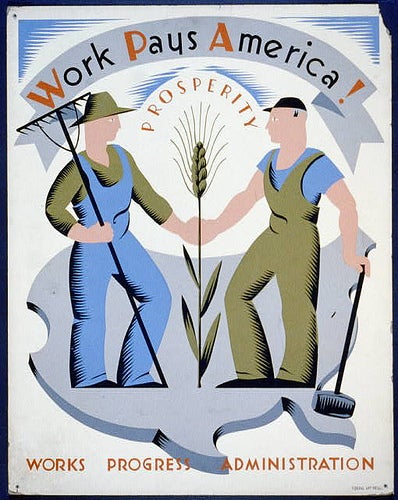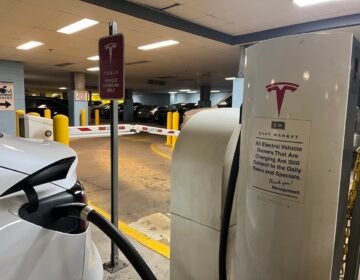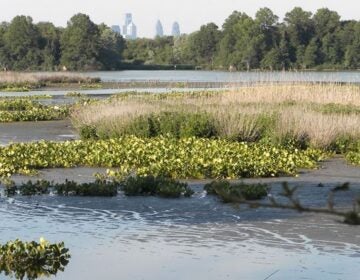Welcoming a New “Green” Deal

Jan. 16
By Thomas J. Walsh
For PlanPhilly
When it comes to “green jobs,” what’s old will be new again.
That was the take-away (in a recyclable cardboard container) from David Foster, president of the Minneapolis-based Blue-Green Alliance, a guest at Thursday evening’s Urban Sustainability Forum at the Academy of Natural Sciences on the Benjamin Franklin Parkway.
Green jobs are really just blue-collar jobs, Foster said, reflecting the name of his organization, which is comprised of the United Steelworkers, the Sierra Club, the Communications Workers of America and the Natural Resources Defense Council. That means water and sewer maintenance jobs, plumbers, carpenters and educators. It means steelworkers cranking out platforms and girding for thousands of new windmills, and autoworkers at assembly lines for cars that run on new kinds of fuel.
“I don’t think there’s anything fancy about green jobs in that respect,” Foster said. “What I’m worried about is that Americans think green jobs mean some weird scientist in a lab somewhere,” dreaming up a concoction to cure global warming.
Other guests were Aaron Durnbaugh and Patricia Lee, both senior executives with the Chicago Department of Environment. Chicago has been a leader in green economic initiatives for about 15 years.
Roland Wall of Town Square, part of the Center for Environmental Policy, a new initiative by The Academy, introduced moderator Leanne Krueger-Braneky, the executive director of the Sustainable Business Network of Greater Philadelphia.
Greenest city in America?
Durnbaugh gave some context to Chicago’s envied green consciousness at the municipal level, whipping through a timeline of events and frameworks such as the “Conserve Chicago Together” initiative and the city’s healthy obsession with green roofs – it has more than 4 million square feet of green roofs, including City Hall, which had its roof greened in 2001. That was a year after the first Green Homes For Chicago Design Competition. In 2002, the Windy City bought $8 million worth of solar panels for schools and museums. Mayor Richard Daley hired a Green Director a few years after that.
“The Chicago Climate Action Plan is about every person in the city of Chicago,” Durnbaugh said. “Every park, every structure” … “It is very much an all-encompassing plan – it is broad and deep.”
Apologizing for what is an overused quote in the City of Big Shoulders (and perhaps among urban planners the world over), Durnbaugh said that Daniel Burnham’s most famous bit of advice truly is applicable for Chicago’s marriage of environmental assertiveness and its economic practicality: “Make no little plans. They have no magic to stir men’s blood.”
That became more obvious after Durnbaugh’s colleague, Patricia Lee, took the podium and matter-of-factly outlined Greencorps Chicago, a groundbreaking community landscaping and job training program started in 1994 – centuries ago in green years.
Greencorps has a nine-month, paid, green jobs training package centered around four tracks: landscaping and horticulture; environmental health and safety; electronics recycling and warehousing; and weatherization. The program gives Chicagoans career guidance and job placement assistance, along with academic enhancement opportunities (GED prep, courses in mathematics and language arts, etc.) and other professional development training, such as resume-building and interviewing skills.
Greencorps also provides citizens with an annual free distribution of plants to more than 300 community groups and on-site installation assistance for 75 community groups and schools. It maintains 15 Chicago park districts and city-owned pocket park sites, and manages the annual Mayor’s Landscape Awards program. It receives and processes about 50,000 pounds of electronics for recycling efforts and some 25,000 pounds of household hazardous waste. It subcontracts five companies and employs a staff of just 15.
Graduates of Greencorps programs find jobs in the field they were trained in, but just as often move on to any and all other kinds of work. “We’re giving them skills that are transferrable,” Lee said, adding that they become ambassadors of green when they “preach to communities that we would [otherwise] have a hard time reaching.”
Don’t believe the hype
Foster said that in the months leading up the November elections, “the issue of green jobs, and especially good green jobs, came to the forefront” as a sort of panacea for everything from the troubled construction and manufacturing industries to “creating a new urban social agenda.”
“We have to stop for a moment amid all this hype,” Foster warned. “Can green jobs actually deliver? Especially in the wake of this growing financial meltdown? … Will it be the way to restore confidence in the North American economy?”
Could go either way, Foster seemed to say. Green jobs will not be “necessarily good or bad. What made blue collar jobs good was the struggle to unionize … from the sweat-shop era to the middle-class era. It’s precisely that kind of struggle and regulatory framework that will make good jobs out of green jobs in the 21st century.”
Foster said the “environmental challenges of the 21st century are going to create our most important” employment, and that about $100 billion spent over next two years would create about a million new jobs, many of them related to wind and solar energy, or biofuels beyond corn-based ethanol. “Compare that to the $700 billion spent to save one job – Henry Paulson’s,” he quipped.
Given his position, heading up a coalition of unions, environmentalists and fair trade advocates that is gaining in power and influence, Foster has no need to hide his politics, and said that watching as greed-mongering banks become nationalized has been something a bit sweeter than just amusing.
“The irony of seeing George W. Bush leave office as the Eugene Debs of the 21st century is priceless,” Foster said, to big laughs from the full auditorium, on what he deemed a balmy night (it was 22-below in Minnesota when he left, he said). “We’ve been handed a very serious problem. We have to go about creating an entirely new economy. We could make no worse mistake than bailing out Wall Street or the automakers … and then turning it back over to the same people.”
We’ve been down this path before, he said. “We’re being pushed by economic forces we seemingly no longer control.” A “Green New Deal” would put a price on pollution and reward work close to home, and recognize “that our wisdom and wants are greater than the free markets.”
“We need transformative change and not incremental change, and we need it now. We’ll either finance all our old problems, or we’ll adopt this New Green Deal for our economy.”
Contact the reporter at www.ThomasJWalsh.info.
ON THE WEB:
Blue-Green Alliance: www.bluegreenalliance.org
Sustainable Business Network: www.sbnphiladelphia.org
Town Square: www.acnatsci.org/townsquare.org
Greencorps Chicago: http://egov.cityofchicago.org/city/webportal/portalDeptCategoryAction.do?deptCategoryOID=-536890255&contentType=COC_EDITORIAL&topChannelName=Dept&entityName=Environment&deptMainCategoryOID=-536887205
Conserve Chicago Together: http://egov.cityofchicago.org/city/webportal/portalEntityHomeAction.do?entityName=Conserve+Chicago+Together&entityNameEnumValue=144
WHYY is your source for fact-based, in-depth journalism and information. As a nonprofit organization, we rely on financial support from readers like you. Please give today.






